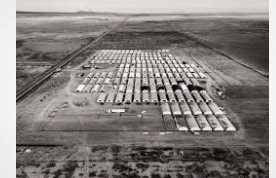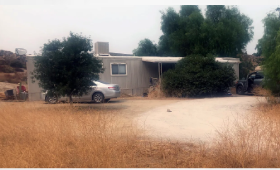SEARCHLIGHT NEW MEXICO
Three months ago, New Mexico issued a $1 million fine to embattled Navajo marijuana grower Dineh Benally and — citing him for “egregious” violations — ordered him to shut down his Torrance County cannabis farm. Benally has done anything but.
Instead of closing up shop, he has expanded his operation along a rural highway near Estancia. In a March 21 phone interview, Benally alluded to a sovereign right to grow cannabis, which he says is a religious sacrament for Native people.
“This is an ancestral plant,” Benally said. “This plant belongs to us as Native people. We as Native Americans, when we’re born, we’re entitled to this land…Anything that grows, that belongs to the Native American.”
This is not the first time Benally’s marijuana ventures have sparked controversy and legal issues, from criminal indictments and a civil suit to community outrage. In 2020, he helped orchestrate a massive illegal marijuana operation on the Navajo Nation that employed more than 1,000 Chinese immigrant laborers — until it was shut down by a raid that netted nearly $2 billion in plants. In the wake of the Shiprock bust, criminal actions were filed against Benally and federal authorities said they launched investigations into human trafficking.
In 2022, Benally received a state license to grow cannabis on acreage south of Estancia, where other problems ensued. The New Mexico Licensing and Regulation Department’s Cannabis Control Division revoked his permit on Dec. 23 and issued him one of the largest fines in its history, charging that his farm was operating in “blatant disregard for public health and safety, and for the rule of law.”
Inspectors found uncontrolled pest infestations, a near-total lack of quality controls and none of the required systems to prevent plants from being sold on the black market. Most notably, they reported that he was growing some 20,000 mature marijuana plants — four times the volume his license allowed.
In the interview with Searchlight New Mexico, Benally waved off the violations. “We have our rights, we have our religion, we have our sacraments,” he said. He protested being treated “like I’m violating people’s rights and I’m violating a law — a law that is man-made, a law that is corrupt and a law that is discriminating.”
Benally said he is undertaking the Estancia venture in partnership with the Oklevueha Native American Church (ONAC), led by James “Flaming Eagle” Mooney, a controversial figure whose claims about being a Native American have long been questioned. According to court filings, Mooney is not a registered member of a federally recognized tribe.
Yet Mooney has persisted in his claims — both for himself and for Benally, who Mooney has named as leader of the ONAC for the Navajo.
“He [Benally] doesn’t need to be registered with the state,” Mooney told Searchlight. “New Mexico thinks they want to register and organize and supervise the development of our sacrament? That ain’t gonna happen. We don’t need the state’s registration. We’re a sovereign nation.”
Mooney said Benally’s farm is supplying ONAC members across the country and “all around the fricking world.”
When asked how much cannabis was being exported, Mooney replied: “As much as we can raise.”
Transporting marijuana across state lines is a federal crime.
Today, Benally’s operation in Torrance County is bigger than ever. Semi-trucks pull in and out of the gated entrance off Highway 41 as workers erect new greenhouses — at least 25 of which have been built in recent months, a review of drone footage shows. In total, roughly 180 large greenhouses sit in plain view beside the county road, the skunky smell of marijuana wafting over the adjacent farmland. Neighbors who share a nearby house have had to stop using their cooling system to keep the smell from invading.
“They just keep building and building more greenhouses, said David Crosby, whose property lies near Benally’s farm. At this rate, Crosby said, “They’ll be able to supply the entire nation with pot. There must be no way to regulate or control this mess.”
State regulators dismissed Benally’s claims of sovereignty and religious rights.
“The Cannabis Control Division respectfully disagrees with Mr. Benally’s assessment of the situation,” general counsel Robert Sachs said in an email. “There are certain substances that are permitted for use in bona fide religious ceremonies” as a result of court decisions. But “cannabis is not one of them,” he said. “The CCD stands by its decision to revoke this business’s license and will continue working with law enforcement to stop this unlicensed, illegal activity.”
For three months, however, there has been no law enforcement action to shut down the property. Such action requires a referral to the New Mexico Department of Public Safety, Sachs said. No such referral was made until March 19, after inquiries from Searchlight.
The case comes amid a larger national struggle with marijuana farms, where criminal enterprises have exploited state cannabis laws to grow weed for the lucrative black market. Since 2020, when a Searchlight investigation uncovered Chinese managers and alleged human trafficking in Shiprock, illegal activity on U.S. marijuana farms has spiked from Maine and Oklahoma to California, news reports and lawmakers say. Chinese organized crime is dominating America’s illicit marijuana market, often using Chinese immigrants as forced labor, a ProPublica investigation found.
Read more at


















